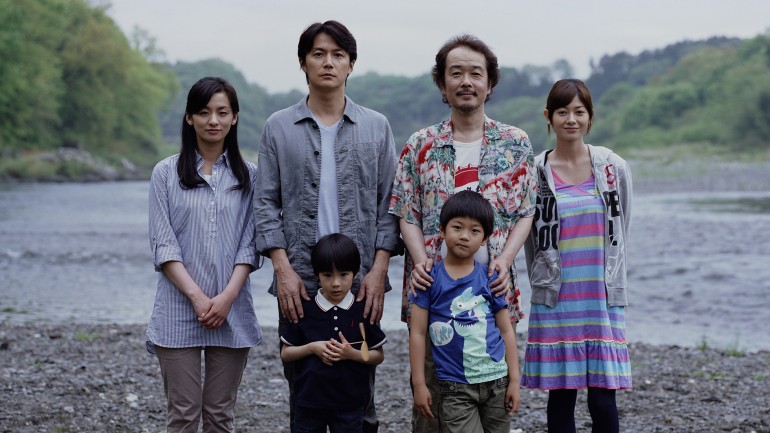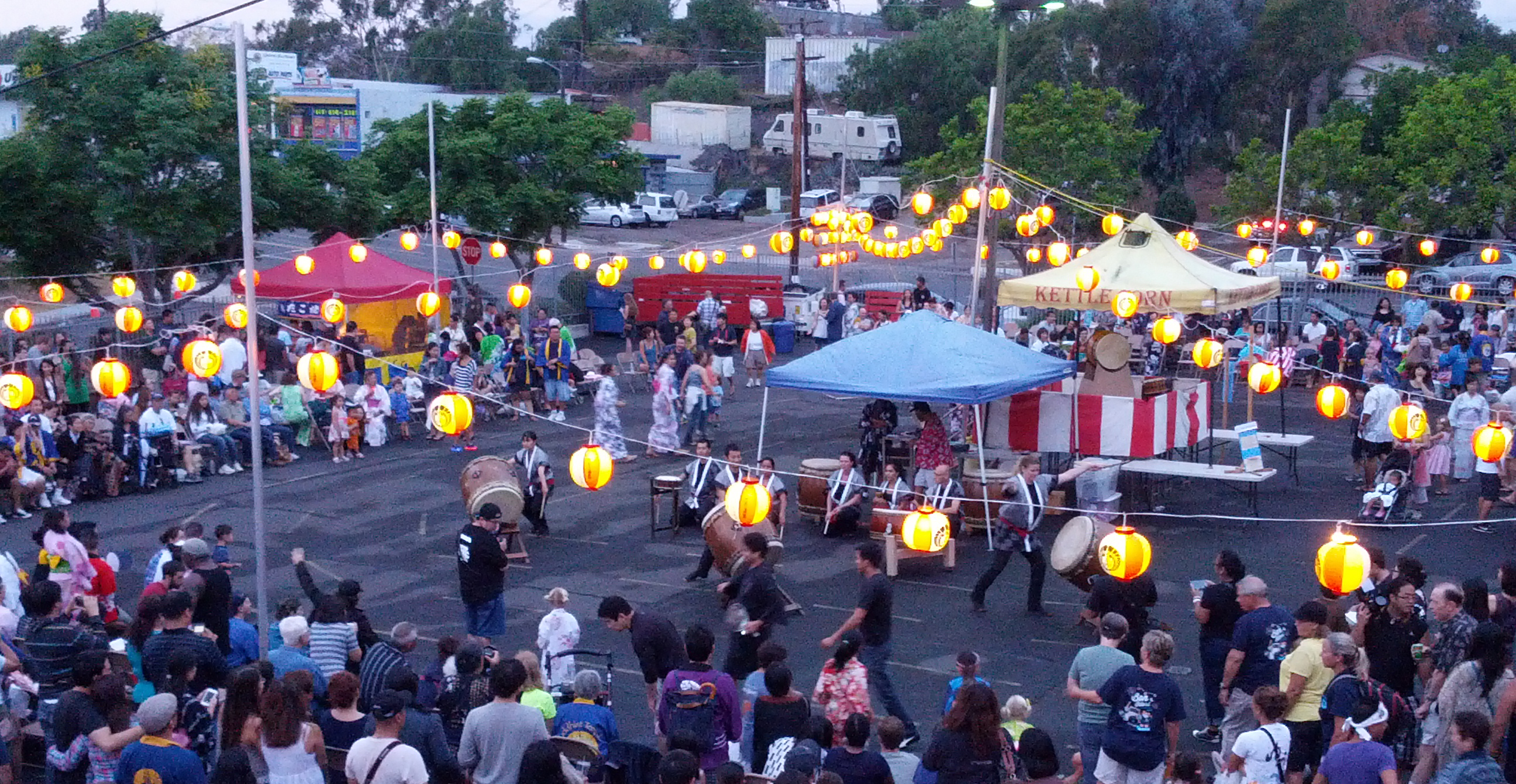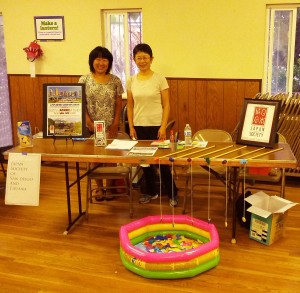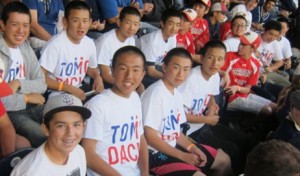2014 Bon Odori
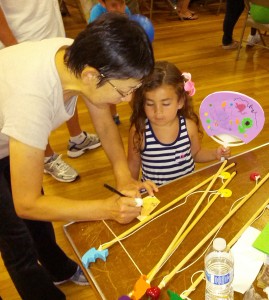 On Saturday, the second of August, I had the great honor of attending my first Bon Odori Festival at the Buddhist Temple of San Diego. It was a blast. The music, the food, the traditional attire of many of the attendees, and of course, the dancing all came together to create a truly spectacular experience. As we arrived, the festival was already underway, and the whole temple was abuzz with celebrators. The festival hall was packed with booths on Japanese culture, including our own Japan Society of San Diego and Tijuana.
On Saturday, the second of August, I had the great honor of attending my first Bon Odori Festival at the Buddhist Temple of San Diego. It was a blast. The music, the food, the traditional attire of many of the attendees, and of course, the dancing all came together to create a truly spectacular experience. As we arrived, the festival was already underway, and the whole temple was abuzz with celebrators. The festival hall was packed with booths on Japanese culture, including our own Japan Society of San Diego and Tijuana.
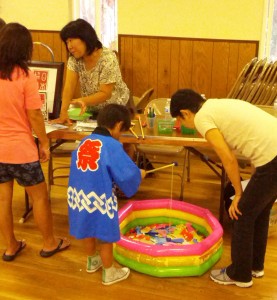 While adults learned about the different organizations and their upcoming events, children created fans, hats and lanterns at an Arts and Crafts station. The festival hall also hosted musical performances before the dance actually started, from traditional Okinawa music comprised of vocals, Jamisen and drums, to a fierce and invigorating Taiko display. At 6:30, the main attraction kicked off in the large, open courtyard outside. Under the lantern-light, dancers encircled the central Yagura, where another group of Taiko players were performing. It was a positively unforgettable evening.
While adults learned about the different organizations and their upcoming events, children created fans, hats and lanterns at an Arts and Crafts station. The festival hall also hosted musical performances before the dance actually started, from traditional Okinawa music comprised of vocals, Jamisen and drums, to a fierce and invigorating Taiko display. At 6:30, the main attraction kicked off in the large, open courtyard outside. Under the lantern-light, dancers encircled the central Yagura, where another group of Taiko players were performing. It was a positively unforgettable evening.
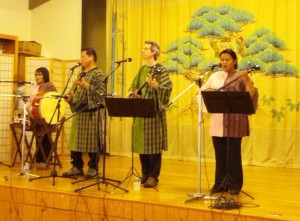 I must admit that, going in, I had no knowledge of what the festival was about. After some research into its cultural history and significance, I realized that the Bon Odori is much more than just what I experienced. In fact, Bon Odori is part of a much larger festival known as Obon, a midsummer commemoration for departed ancestors. Obon, which has been celebrated in Japan for over 500 years, is a way for families to come together and pay homage to their heritage.
I must admit that, going in, I had no knowledge of what the festival was about. After some research into its cultural history and significance, I realized that the Bon Odori is much more than just what I experienced. In fact, Bon Odori is part of a much larger festival known as Obon, a midsummer commemoration for departed ancestors. Obon, which has been celebrated in Japan for over 500 years, is a way for families to come together and pay homage to their heritage.
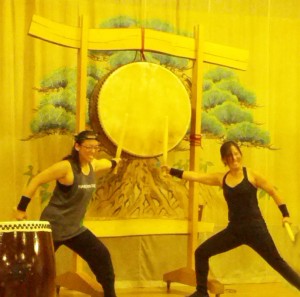 Its roots lie in the tale of Mokuren, a disciple of Buddha who used his powers to commune with his deceased mother. To his dismay, he saw that she was suffering at the hands of the Gaki, the hungry spirits of dead. Distressed, Moruken consulted Buddha, who instructed Moruken to make offerings to the many Buddhist monks who had just completed their summer retreat, on the fifteenth day of the seventh month. He did so, and his mother’s spirit was freed. Overjoyed, Moruken began to dance in celebration. Form this, as legend has it, came the Obon festival and the Bon Odori dance.
Its roots lie in the tale of Mokuren, a disciple of Buddha who used his powers to commune with his deceased mother. To his dismay, he saw that she was suffering at the hands of the Gaki, the hungry spirits of dead. Distressed, Moruken consulted Buddha, who instructed Moruken to make offerings to the many Buddhist monks who had just completed their summer retreat, on the fifteenth day of the seventh month. He did so, and his mother’s spirit was freed. Overjoyed, Moruken began to dance in celebration. Form this, as legend has it, came the Obon festival and the Bon Odori dance.
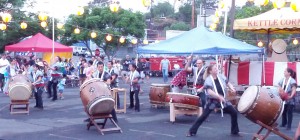 Bon Odori, which actually means Bon dance, is the main style of dancing performed during Obon. Although most Bon Odori festivals include a circle of dancers around a raised wooden scaffolding known as the yagura, each region has its own distinct songs and dances. In modern Bon Odori festivals, music can range from songs about the Obon to classic min’yo folksongs, and even some enka hits.
Bon Odori, which actually means Bon dance, is the main style of dancing performed during Obon. Although most Bon Odori festivals include a circle of dancers around a raised wooden scaffolding known as the yagura, each region has its own distinct songs and dances. In modern Bon Odori festivals, music can range from songs about the Obon to classic min’yo folksongs, and even some enka hits.
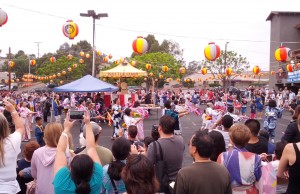 After enlightening myself on the history and cultural significance of the Bon Odori, and experiencing the event firsthand, I feel I have a much greater understanding of festival I took part in. I enjoyed every minute that I was able to spend listening to the traditional music, and watching the dances and festivities, and I feel that my awe was only heightened at learning the rich history behind it. I cannot wait for next year’s!
After enlightening myself on the history and cultural significance of the Bon Odori, and experiencing the event firsthand, I feel I have a much greater understanding of festival I took part in. I enjoyed every minute that I was able to spend listening to the traditional music, and watching the dances and festivities, and I feel that my awe was only heightened at learning the rich history behind it. I cannot wait for next year’s!
TOMODACHI Initiative Ofunato – San Diego Youth Baseball Exchange
About the TOMODACHI Initiative
The TOMODACHI Initiative is a public-private partnership, born out of support for Japan’s recovery from the Great East Japan Earthquake, which invests in the next generation of Japanese and American leaders through educational and cultural exchanges as well as leadership programs.
Website: usjapantomodachi.org Facebook: facebook.com/USJapanTOMODACHI Twitter: twitter.com/JapanTomodachi
TOMODACHI Initiative Ofunato – San Diego Youth Baseball Exchange July 31 – August 9 Ofunato, Japan
The Japan Society of San Diego and Tijuana (JSSDT) hosted a team of middle school baseball players from Ofunato in August of 2013 as part of this important initiative. In August of 2014, 10 players from San Diego will travel to Ofunato for home stays, cultural activities, and the great game of baseball, completing the first full exchange cycle.
This program is funded by TOMODACHI’s Fund for Exchanges through generous contributions from
Toyota Motor Corporation, Mitsubishi Corporation, and Hitachi, Ltd.
Spring Showcase “Like Father Like Son”
The Pacific Arts Movement (Pac-Arts) will present its 4th Annual Spring Showcase from April 17 to 24 at the UltraStar Mission Valley, including 11 Asian and Asian-American films from 9 countries. The JSSDT will co-present the closing film “Like Father, Like Son,” a drama about two sets of parents who find out their 6 year-old sons were switched at birth in the hospital. Buy advance tickets at pac-arts.org.
